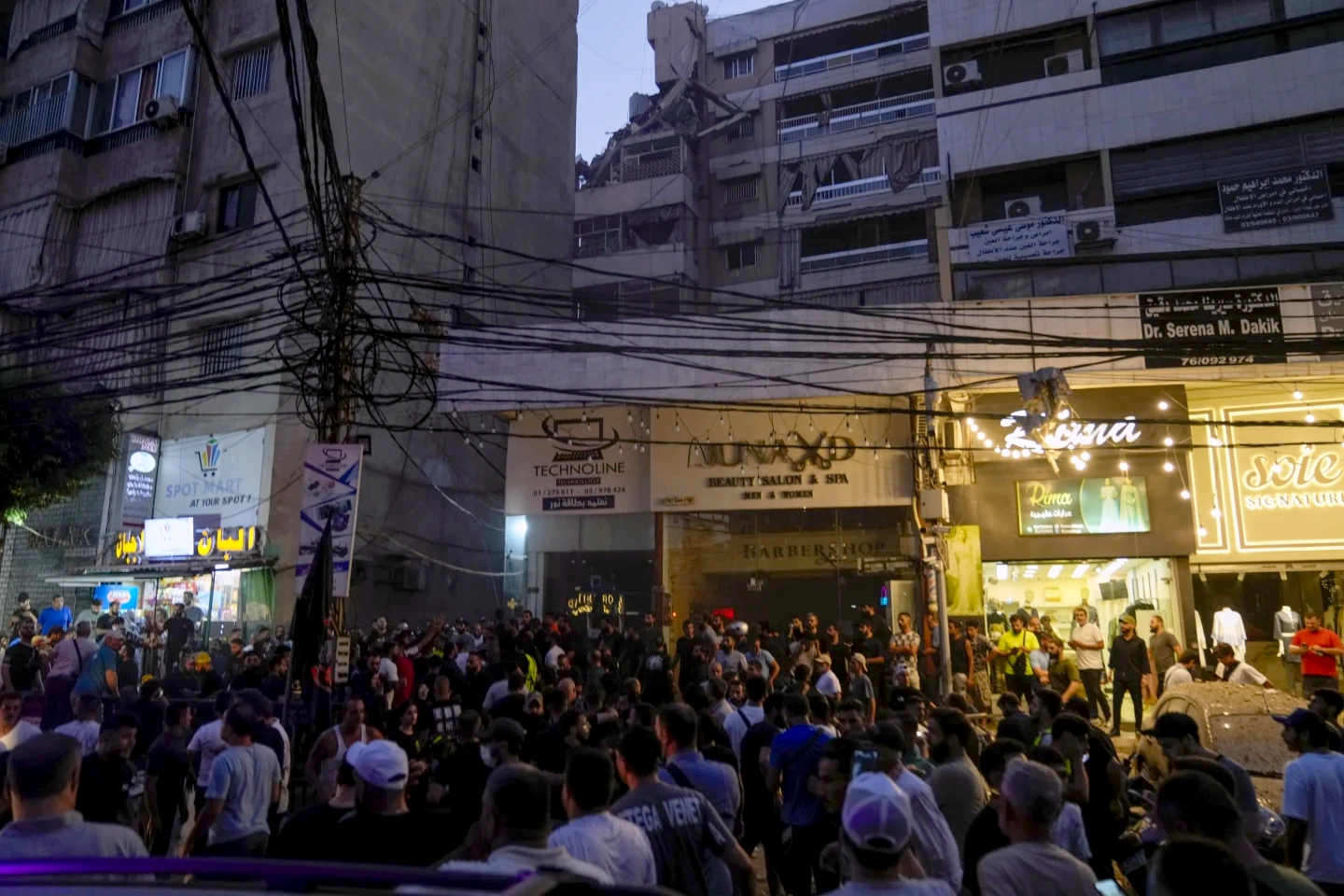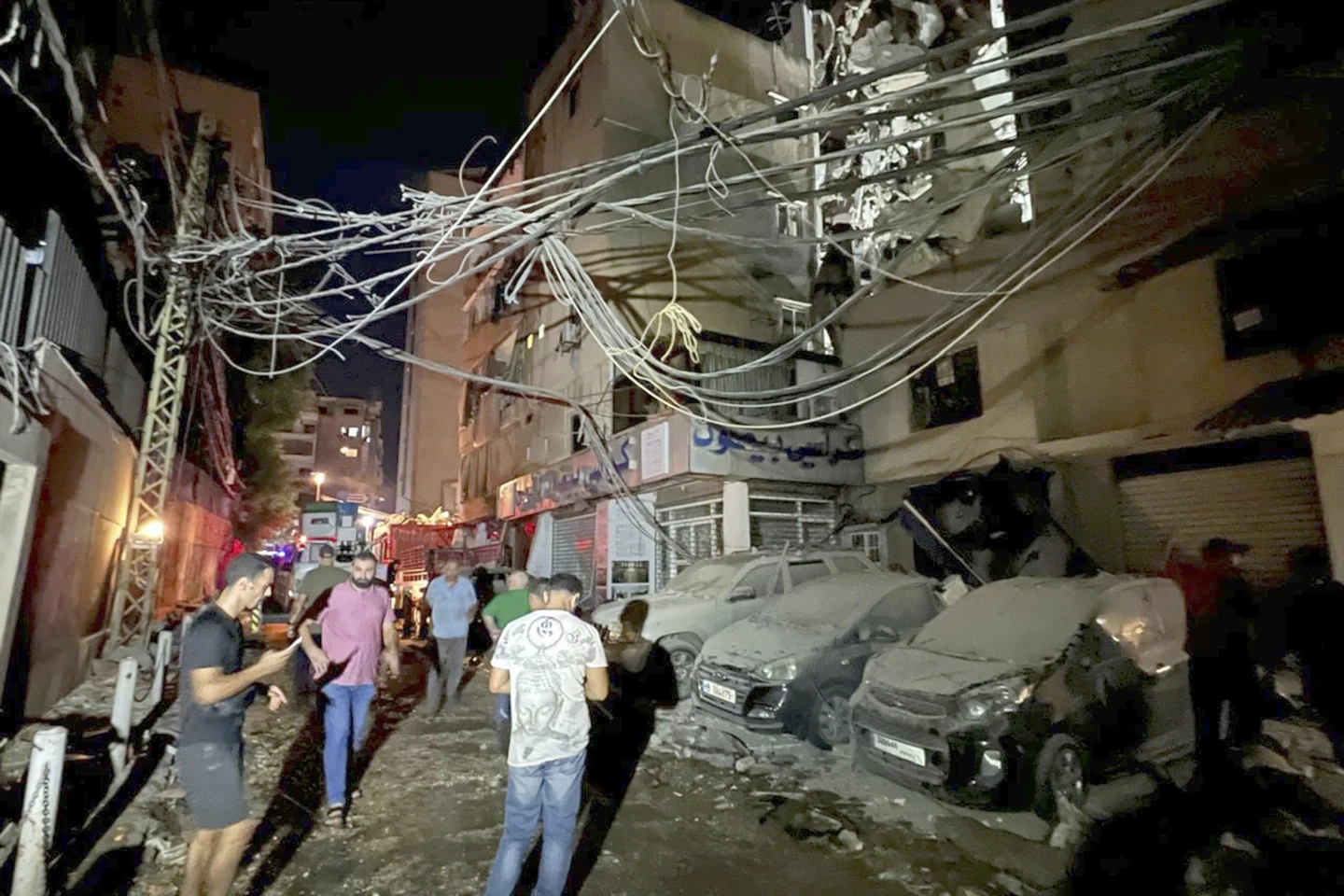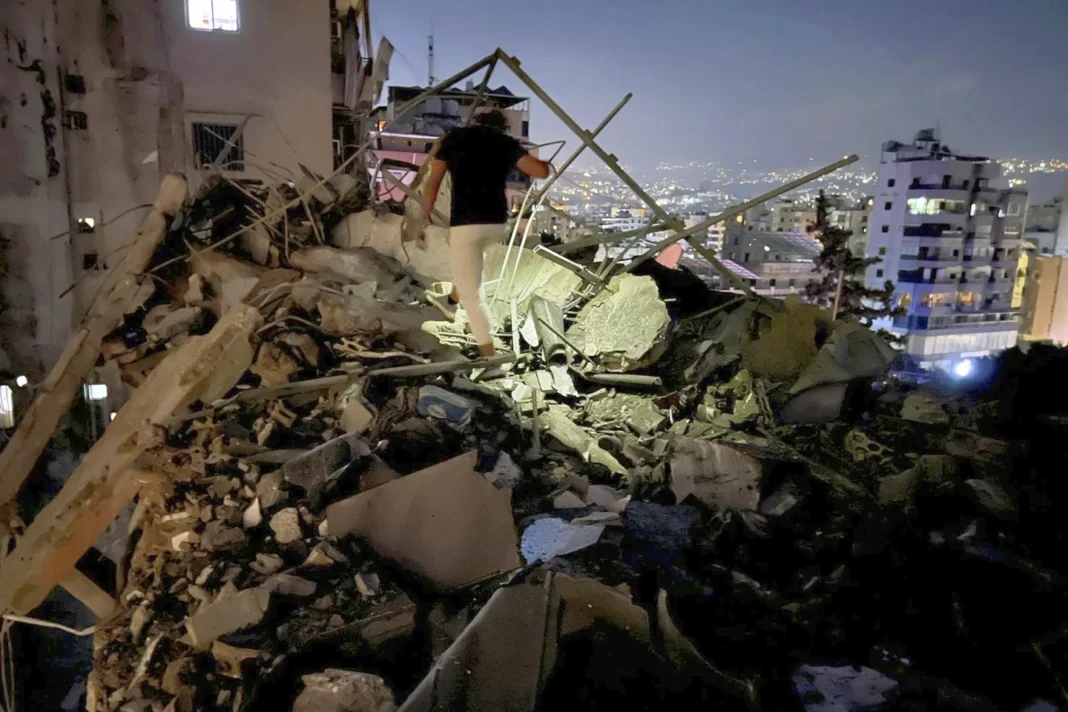|
Getting your Trinity Audio player ready...
|
Edited by: Fern Sidman
In a significant escalation of regional tensions, Israel conducted an airstrike on Beirut’s southern suburbs on Tuesday evening, targeting a senior Hezbollah commander accused of orchestrating a deadly rocket attack that resulted in the deaths of 12 Druze children over the weekend. The Guardian of the UK reported that the Israeli Defense Forces (IDF) confirmed the operation, stating that the objective of the strike was the elimination of the individual responsible for the tragic incident that occurred in a Druze community in the Golan Heights.
“The IDF carried out a targeted strike in Beirut, on the commander responsible for the murder of the children in Majdal Shams and the killing of numerous additional Israeli civilians,” the army said.
The White House was reportedly informed ahead of time about the strike. CNN reported that the heads-up was conveyed by Jerusalem through “security channels” but did not say when it was given.
A Lebanese security source told the Reuters wire agency that the terrorist’s fate remained unclear following the strike, which caused a large blast in Dahiyeh, a Hezbollah stronghold in southern Beirut.
Lebanon’s state-run National News Agency reported that the attack was said to have targeted a senior operative of the group’s Jihad Council, which is subordinate to the Shura Council and is under the direct control of Hezbollah Secretary-General Hassan Nasrallah. The Jewish News Syndicate reported that Fu’ad Shukr—also known as al-Hajj Mohsin—served as a senior “military” adviser to Nasrallah and played a central role in the planning and execution of the U.S. Marine Corps Barracks bombing on Oct. 23, 1983, in the Lebanese capital, which killed 241 U.S. service personnel. The US has placed a $5 million bounty on his head.

The Al Arabiya and Al Hadath Arabic news stations reported that Shukr was eliminated and that his body is being held in a secure hospital, contradicting earlier reports that he had left prior to the airstrike, as was indicated in a report on the Israel National News web site. A senior Israeli official told Kan News that the Israeli government believes the Shukr was killed in the strike. However, the official stressed that there has not been final confirmation of this.
INN also reported that the Lebanese Health Ministry told the New York Times that one person was killed and 35 were injured in the strike, three of whom were seriously injured.
The IDF Spokesperson’s Unit stated,”The IDF carried out a targeted strike in Beirut, on the commander responsible for the murder of the children in Majdal Shams and the killing of numerous additional Israeli civilians. At the moment, there are no changes in the Home Front Command defensive guidelines. If any changes will be made, an update will be released.”
The airstrike comes three days after 12 Druze children were murdered in a Hezbollah rocket attack in Majdal Shams in the Golan Heights.
On Tuesday afternoon, an Israeli man was killed in a Hezbollah rocket attack on the Galilee.
According to the information provided in The Guardian of the UK report, a powerful explosion rocked the Lebanese capital shortly before 8 p.m. local time, with witnesses reporting thick plumes of smoke rising from the targeted area, a known stronghold of the Iranian backed terror group Hezbollah. The Guardian of the UK report also noted that the IDF released a statement following the strike, asserting, “The IDF carried out a targeted strike in Beirut, on the commander responsible for the murder of the children in Majdal Shams and the killing of numerous additional Israeli civilians.”
The attack was said to have targeted a senior operative of the group’s Jihad Council, which is subordinate to the Shura Council and is under the direct control of Hezbollah Secretary-General Hassan Nasrallah. The Jewish News Syndicate report noted that Fu’ad Shukr—also known as al-Hajj Mohsin—served as a senior “military” adviser to Nasrallah and played a central role in the planning and execution of the U.S. Marine Corps Barracks bombing on Oct. 23, 1983, in the Lebanese capital, which killed 241 U.S. service personnel.
The airstrike was a direct response to a rocket attack that took place over the weekend, killing 12 children who were playing football in Majdal Shams, a Druze village in the Golan Heights, the Guardian report indicated. The attack has been attributed to Hezbollah, though the group has denied involvement. The tragic event has heightened tensions and led to calls for retribution within Israel. The report added that Israeli Prime Minister Benjamin Netanyahu had vowed a “harsh” response, a promise that was swiftly realized with the strike on Beirut.
“Hezbollah crossed a red line,” Israeli Defense Minister Yoav Gallant wrote in a post on X after the attack in Beirut.
Prime Minister Netanyahu approved the attack on Sunday. The nature of the attack–in Beirut, in broad daylight, targeting senior officials–is intended to serve as a deterrent by indicating that Hezbollah has no effective defenses even for their most important assets.
In addition to the attacking jet, Israel reportedly has numerous waves of aircraft on high alert to prepare for any possible response. Israeli analysts believe that while Hezbollah will fire significant rocket salvos in response, there will be no further escalation, and no catalyst for an Israeli ground offensive.
The elimination of a target wanted by the US comes at a time when Israel has been subject to significant criticism for the value of the defense aid it receives, and serves as a powerful message of the importance to the US of continuing to support Israel. This is particularly true given that the target has been the subject of a $5 million dollar bounty by the US State Department for years, but has nevertheless evaded capture until now.
Choosing a target wanted by the US also minimized the diplomatic consequences of attacking a civilian area, despite the American objections that have been raised against such attacks in Gaza.
“With Iranian backing, Hezbollah attacked here with an Iranian missile, taking the lives of 12 pure souls,” the prime minister said, according to the JNS report. “These children are our children; they are the children of all of us. The State of Israel will not and cannot let this pass. Our response will come, and it will be tough.”
Hezbollah has vowed to respond forcefully to any Israeli military action against it, irrespective of the scope of Jerusalem’s retaliatory attack.
“Foreign envoys suggested we don’t retaliate to any strike so as not to expand the conflict … [but] we will respond,” a senior Hezbollah terrorist told Qatar’s Al Jazeera channel earlier on Tuesday, the JNS report said.
“The leadership of the resistance is in a state of complete readiness and will decide the form and size of the response to any potential aggression,” the terrorist official said. He warned that Hezbollah is capable of attacking army bases in the Golan Heights and Haifa area.

In the days leading up to the airstrike, the United States spearheaded a global diplomatic campaign aimed at preventing an escalation of hostilities. Efforts were made to dissuade Israel from targeting Beirut or key Lebanese infrastructure, fearing that such actions could spiral into a broader conflict, as was indicated in the information contained in The Guardian report. Despite these efforts, the rocket attack that killed a civilian in northern Israel on Tuesday further inflamed the situation, increasing domestic pressure on the Israeli government to take decisive action against Hezbollah.
According to the IDF, the deadly Hezbollah barrage comprised around 10 rockets, most of which were intercepted. The military responded by attacking the source of the fire with artillery.
Hezbollah claimed responsibility for the deadly attack, confirming it launched dozens of rockets at a nearby IDF military base.
The Israel Police said security forces were dispatched to multiple scenes where rockets impacted throughout the Galilee panhandle, adding that officers were working to remove danger to the public, The Guardian reported.
Following the attack, the Upper Galilee Regional Council ordered residents of eight northern kibbutzim that have not been evacuated to stay near bomb shelters and avoid public gatherings until further notice. The Guardian reported that air-raid sirens subsequently sounded in several border communities, including HaGoshrim, due to what the IDF Home Front Command said was the suspected infiltration of a “hostile aircraft” into Israeli airspace.
Later on Tuesday, Hezbollah claimed responsibility for additional attacks on northern Israel, including the launch of a volley of Katyusha rockets at the town of Beit Hillel, located just southwest of HaGoshrim. The Iran-backed terrorist organization admitted to carrying out at least six separate attacks on the Jewish state throughout the day on Tuesday.
The strike has prompted a wave of international reactions and travel advisories. Countries including the UK, Germany, France, and the United States have advised their citizens to leave Lebanon or avoid traveling there, as was noted in the Guardian of the UK. British Foreign Secretary David Lammy described the situation as “fast-moving” and urged British nationals to prioritize their safety and exit the country if possible.
In other news that has been dominating the headlines, JNS reported that Tuesday that in a significant diplomatic maneuver, Israeli Foreign Minister Israel Katz has instructed Israeli diplomats worldwide to lobby their respective governments to take a firm stance against Turkey. This call to action follows threats from Turkish President Recep Tayyip Erdoğan to invade Israel, according to a report by Channel 12 News on Tuesday.
Foreign Minister Katz is pushing for international condemnation of President Erdoğan and seeking to have Turkey expelled from NATO. Katz argued that Turkey’s recent actions and rhetoric violate the founding principles of NATO, which are rooted in democracy, individual liberty, and the rule of law, according to the information provided in the JNS report. The NATO treaty emphasizes the commitment of member nations to safeguard the freedom and common heritage of their peoples.
The diplomatic push comes in response to Erdoğan’s recent televised address, in which he issued a veiled threat to invade Israeli territory. Drawing parallels to Turkey’s military interventions in Karabakh and Libya, Erdoğan stated, “Just like we entered Karabakh, just like we entered Libya, we might do similarly to [Israel]. There is no reason why we cannot do this,” as was indicated in the JNS report. This statement has been perceived as a direct threat to Israel’s sovereignty.
In response, Katz warned Erdoğan to tread carefully, invoking historical precedent by comparing Erdoğan’s threats to those made by former Iraqi President Saddam Hussein. “Erdoğan follows in the footsteps of Saddam Hussein and threatens to attack Israel. Just let him remember what happened there and how it ended,” Katz remarked, according to the JNS report.
Erdogan also drew parallels between Israeli Prime Minister Benjamin Netanyahu and Adolf Hitler. Following his remarks, the Foreign Ministry declared, “Just as the end of the genocidal Hitler came, so will be the end of the genocidal Netanyahu. Just as the genocidal Nazis were held accountable, so will those who try to destroy the Palestinians.”
Erdogan’s comparison between Netanyahu and Hitler marks a stark escalation in rhetoric from Ankara, severely undermining recent attempts to mend diplomatic relations with Jerusalem. JNS reported that in a notable development, Erdoğan and Netanyahu agreed to meet on the sidelines of the U.N. General Assembly in late 2023, signaling a potential thaw after years of fluctuating tensions. However, this tentative rapprochement was short-lived.
Despite Katz’s efforts, the prospect of removing Turkey from NATO remains unlikely. Turkey plays a critical role in the alliance, providing strategic military bases near Russia and maintaining the largest army in terms of personnel among NATO members, the report on JNS said. Moreover, NATO has never expelled a member state since its inception, adding another layer of complexity to Katz’s proposal.
Israeli officials have also expressed frustration with Western countries for their perceived inaction in condemning Erdoğan’s pro-Hamas rhetoric and anti-Semitic statements. JNS also reported that this diplomatic silence has been a point of contention for Israel, which seeks stronger international support in countering clear cut threats to its national security.
The comparison marks a stark escalation in rhetoric from Ankara, severely undermining recent attempts to mend diplomatic relations with Jerusalem. In a notable development, Erdoğan and Netanyahu agreed to meet on the sidelines of the U.N. General Assembly in late 2023, signaling a potential thaw after years of fluctuating tensions. However, this tentative rapprochement was short-lived.

The fragile relationship deteriorated rapidly following the October 7 incursion by Hamas terrorists into Israel, resulting in the deaths of approximately 1,200 Israelis and the kidnapping of around 250 others. This brutal attack significantly altered the dynamics between Turkey and Israel. The JNS report revealed that Turkey, which has been hosting a Hamas headquarters since 2012, openly supported the Palestinian terrorist group following the massacre.
Erdoğan’s condemnation of Netanyahu has been relentless and vitriolic. In May, he described Netanyahu as a “vampire who feeds on blood” during a speech to his AK Party, calling on Muslims to counter the “threat” posed by Israel, as was indicated in he JNS report. His rhetoric has consistently portrayed Israel as an aggressor and an oppressor of Palestinians.
Earlier this month, Erdoğan told Newsweek that the actions of Palestinian terrorists in Gaza are a form of self-defense, stating, “What is between Israel and Gaza is not war. Israel has been treating Gaza as an open-air prison for years. They are usurping Palestinians of their homes, businesses and farmlands throughout Palestinian territory, using thieving terrorists they call settlers.”
These statements have profound implications for regional stability and international relations. Erdoğan’s support for Hamas and his stark criticism of Israel exacerbate an already volatile situation in the Middle East. This alignment with Hamas places Turkey at odds with Western nations that view Hamas as a terrorist organization and support Israel’s right to defend itself against such attacks.





